Introducing the latest myCWT product and service enhancements
Building on our digital, omnichannel myCWT platform, our new products and services will simplify travel management for you and your employees – anytime, anywhere, anyhow.
Note: Featured services may not be available in your country at this time. Please reach out to your CWT representative for more details.
Hear from Chief Product Officer, Erica Antony as she shares the key product highlights of 2024, along with the key areas driving innovation.
-

2040: Baseline, Boom or Bust
As we enter an era of rapid transformation and unprecedented challenges, it is essential for travel managers, meeting & event planners, and corporate decision-makers to look ahead and frame our current strategic thinking with a clear vision of the future. Business travel and meetings and events (M&E) are poised for significant change over the next decade and a half, driven by a complex interplay of sustainability goals, technological advancements, evolving work models, and geopolitical dynamics.
In this paper to mark the 10th anniversary of our Global Business Travel Forecast, we explore, for the first time, a long-term vision of the future and potential trajectories through three distinct scenarios, each offering insights into how these forces should affect policy-making, budgeting and priorities. By examining these scenarios, we can better understand the diverse possibilities that lie ahead and the strategic imperatives required to thrive in each potential future.
Based on trajectory data analysis and interviews with industry leaders, behaviorists and climate tech founders, this forward-looking approach enables us to anticipate changes, strengthen our strategies, and make informed decisions that align long-term objectives. It is through this lens of foresight and adaptability that we can build resilience, seize opportunities, and navigate the complexities of the future.
We invite you to reflect on the insights presented, and consider how your organization can prepare for the opportunities and challenges that lie ahead. Together we can ensure that travel and meetings remain catalysts for growth, scalability and sustainable practices.
- Scenario development is both an art and a science
- Megatrends Shaping the Future of Business Travel, Meetings and Events
- Sustainability goals the new crux of corporate policy
- Technology Revolutionizes Travel Management
- Modern work models spark new travel patterns
- Changing demographics open doors to new opportunities
- Three Scenarios: Base case, boom and bust
- Future-proofing strategies

-

CWT GBTA Global business travel forecast 2025
When it comes to pricing, global business travel has finally reached an enduring, higher baseline. Prices will continue to rise in 2025, but only moderately, so expect a period of normalized growth.
However, this pricing environment, one of marginal gains and price regularity, is fragile. Global leisure travel has now realized a lot of its pent-up demand, while corporate travel has been resurgent, with 2024 edging at preCovid levels.
There are many factors at play, whether its volatile oil prices, labor costs and constraints, inflationary pressures, and geopolitical factors. As this elevated baseline edges upwards, albeit marginally, travel budgets will come under increased scrutiny, especially as travel patterns and attitudes change.
It’s why business travel can’t be viewed in a silo, and the true value to an organization must be fully realized. This forecast can help with those calculations.

-

Capitalize on emerging technologies in corporate travel
Technological advancements are accelerating at an unprecedented pace. How will emerging innovations like Generative AI, blockchain, and self-sovereign identity (SSI) transform corporate travel?
BTN and CWT probed global CEOs, travel managers, industry consultants and tech experts on the promises, questions, and expectations these innovations raise and how they are set to reshape traveler experience, cost control and service delivery in corporate travel and events.
Download and discover
- The technologies that will have the greatest impact on corporate travel in the next 2-5 years
- How these emerging technologies are poised to control costs, enhance service and security, and boost efficiency
- The critical challenges, opportunities, risks and roadblocks each innovation raises
- What travel managers, buyers and experts anticipate from these innovations

-
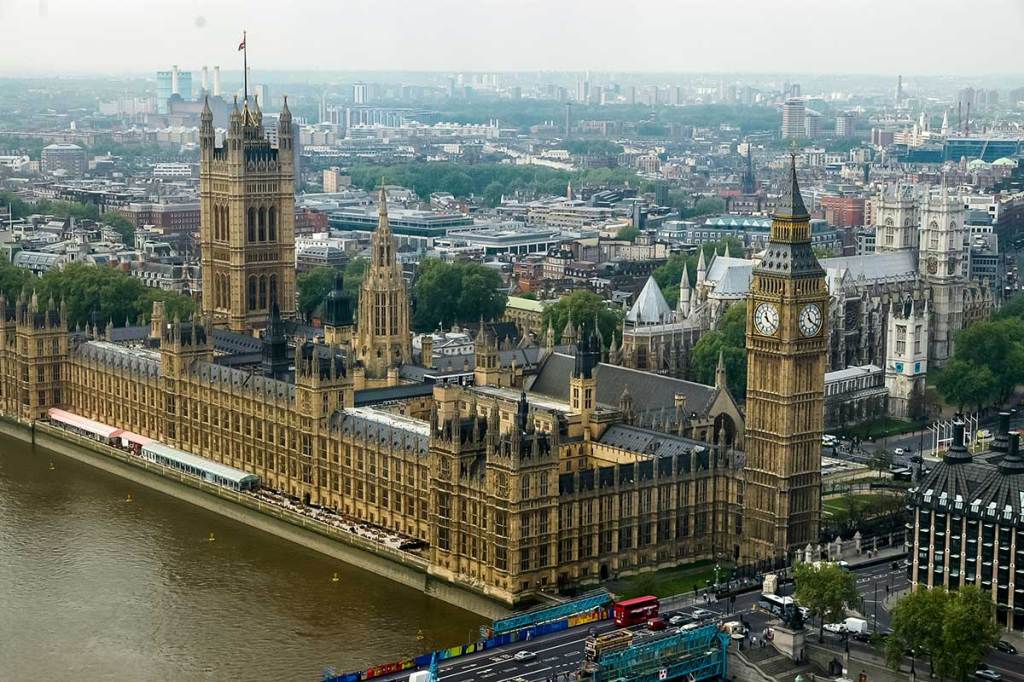
Speaking up for travel: How to get involved in 23 June Travel Day of action
Across the globe, we have experienced the loss of things we took for granted and the collective power of continued, small actions.
By adhering to advice from scientists, all of us have played a part in getting closer to defeating the Covid-19 pandemic. Digital acceleration and social media allowed us to adapt and share information that changed the trajectory of critical decision-making.
Looking back to before Covid-19, the UK had the largest aviation market in Europe and the third largest globally, contributing £22 billion to GDP and directly providing 230,000 jobs. 16 months into the pandemic and travel to and from the UK continues to be limited in scope with current restrictions prohibiting travel at scale.
The impact of restrictions is staggering. Globally, more than 62 million travel and tourism related jobs were lost in 2020 alone, according to the World Travel & Tourism Council. Of course, restrictions were necessary. But we’re now at a crossroads.
International travel connects the world, enabling families and friends to reunite, opportunities to arise, culture to flourish, perspectives to widen, and millions of families to benefit from employment.
The UK has led the vaccination race with 82% of the adult population receiving the first dose and 60% the second doses (as of 21 June), according to gov.uk. It was hoped that this would lead to an easing of restrictions. We are, after all, seeing the safe opening up of shops, restaurants, and bars but the UK travel industry remains in lockdown.
By contrast, we’re seeing a relaxation of travel restrictions across Europe. On the 11 June EU countries agreed to easing travel restrictions that will allow fully vaccinated tourists to avoid tests and quarantines. The revised guidelines come as the EU introduces Covid-19 certificates that will indicate whether a person is vaccinated, has immunity because they were previously infected or has had a recent negative test. The system is set to be ready by the 01 July.
Our neighbours in Europe have a timeline for travel reopening whereas the UK Travel Sector is still in limbo.
On the 23 June trade bodies across the aviation and travel industries are coming together for a travel industry day of action (#traveldayofaction) requesting the UK government to support a safe return to international travel.
The day of action will be calling on the government to:
- Allow international travel to return safely and in a risk managed way by properly implementing the Global Travel Taskforce’s plan.
- Bring forward a package of tailored financial support to recognise that the unlocking of international travel, and hence businesses’ ability to trade and generate income, will be much slower than first anticipated, and more gradual than for businesses in the domestic economy.
On the day itself there are ways that we can support #traveldayofaction.
- UK residents can send a letter to their local MP urging them to speak up for our industry.
- On the day itself like, share, retweet posts on #traveldayofaction.
In the UK and beyond, individuals can make a difference by researching facts, writing to decision-makers and sharing on social channels, from reputable sources. Just as stemming the spread of the virus couldn’t have happened without each and every one of us, so to will safely re-opening international travel for the benefit of millions.
Image credits: Adobe Stock
-
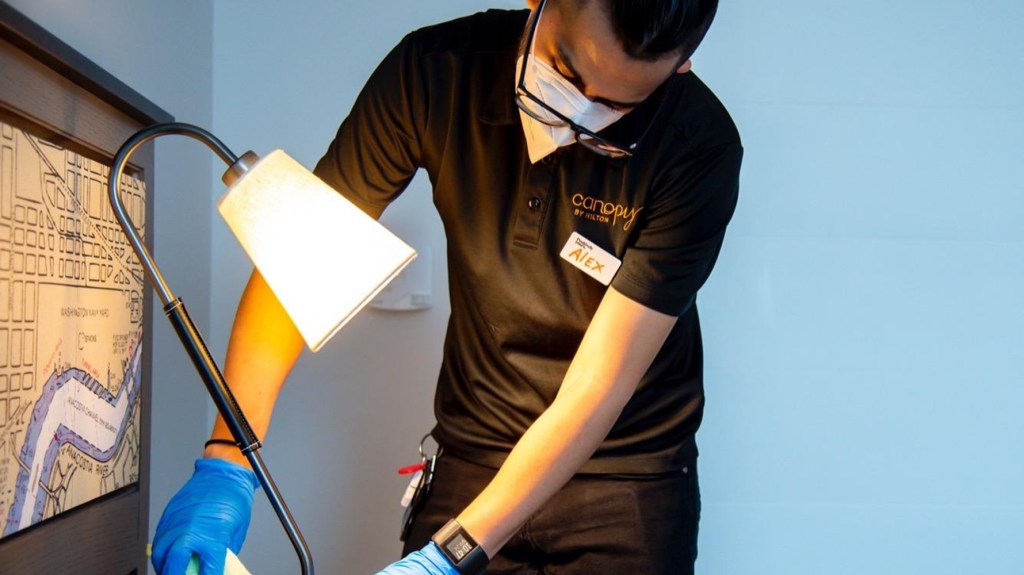
Listening and leading: How Hilton continued innovating during the pandemic
Travel is an unstoppable force, and meetings and events create meaningful human connections. Again and again, history has shown both statements to be true – we’ve seen recessions slow business and storms devastate communities, but we always rebuild, we always recover and we always innovate.
What we are all experiencing in the pandemic – whether as a global hospitality company, as hotel owners, or as event planners – has no script or roadmap. At Hilton, it has been unlike anything we’d seen in our 100+ years of business.
Through our toughest days, though, what keeps me and the team going is our collective purpose. In the words of our founder Conrad Hilton, our vision is “to fill the earth with the light and warmth of hospitality.” The world needs hospitality and human connection now more than ever. The trick is to quickly evolve within all of the new constraints – and then keep listening and innovating.
Flexibility was (and continues to be) top-of-mind for customers. By reviewing our policies and loyalty benefits through that lens, early in the pandemic, we saw that we could make some quick changes. We wanted our customers and guests to know early on that we would partner with them through this challenging time.
We first made adjustments to our modification and cancellation policies for transient reservations. This optimized flexibility, given that travel remained restricted in many parts of the world but had begun to resume in others.
We also announced a number of updates to our Hilton Honors benefits since members were not able to travel as often. This included extending members’ 2019 and 2020 member tier status, rolling over nights earned in 2020 to count towards 2021-2023 tier status, pausing the expiration of Points scheduled for 2020 and extending the expiration date of Weekend Night Rewards.
Cleanliness
In addition to flexibility, cleanliness was and remains to be top-of-mind for customers ready to travel – or who need to travel, such as essential frontline workers. In fact, when asked, customers said that three out of the top four actions a hotel could take to make guests feel safer focused on additional cleaning. This is why in June 2020 we rolled out Hilton CleanStay our industry-leading program designed to deliver elevated standards of cleanliness throughout the entirety of their stay. Through this program, we implemented a number of operational changes to help ensure each guest’s stay is a safe and positive experience. While we continue to update and evolve this program, some on-property experience changes include:
Online Resources
Even before departure, we direct our guests and customers to visit Hilton.com/cleanstay, as well as the property website, to learn more about our cleanliness program and what to expect during their stay.
The Lobby Experience
Guests who prefer a contactless arrival experience can download the free Hilton Honors mobile app. Guests who book directly through the app, on Hilton.com, or through a preferred travel advisor can check in, choose their room, check out and even unlock their guest room door with Hilton Digital Key where available. If they prefer a traditional check-in, physical distancing measures are in place directing them how to move through the in-person check-in and check-out process in a safe way.
Face Coverings
In the U.S, and Caribbean, and Latin America – in an effort to protect everyone who visits as well as works in our hotels – both team members and guests are required to wear face coverings while in indoor, public areas at our hotels.
Housekeeping Service Options
The frequency of housekeeping services is now based upon guest preference, recognizing that some may not want staff entering their room.
Reimagined Public Spaces
The frequency with which we clean the public areas has increased and physical set-ups may have changed. For instance, fitness centers may be closed multiple times a day for cleaning. Equipment has been properly adjusted and positioned to enable physical distancing, and the number of guests in the fitness center at any one time may be limited.
Food and Beverage Offerings
During breakfast, restaurants offer a range of options, including grab & go, pre-plated covered items, à la carte, and assisted service. When ordering room service (where provided), guests can experience contactless delivery.
Coat Check/Luggage/Bell Service
Where valet parking services are suspended, self-parking is now available. Luggage and doorman services also vary by property, so we’re encouraging guests to check availability with the local hotel team; carts will be available for self-service, and sanitized after each use. Attended coat check service may be available based on the hotel. Otherwise, self-serve coat check will be available with sanitized coat hangers.
Creating the Future, Together
This pandemic continues to teach all of us important lessons – about our shared resilience and ingenuity but also about our dedication to our communities, company, and each other. Throughout the last 18 months, we as a company and a sales organization, in partnership with our customers and owners, have taken bold steps, leading the recovery efforts for both our business and the industry – and we will continue to do so. Though the world has changed dramatically, one thing remains constant: our commitment to hospitality.
-
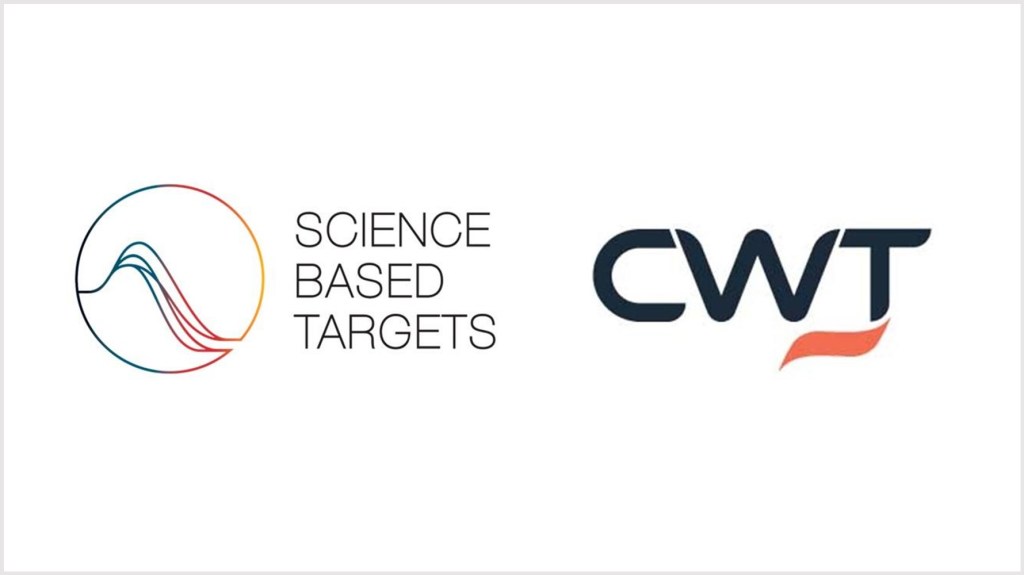
CWT commits to setting Science Based Targets (SBTs) against climate change
CWT, the Business-to-Business-for-Employees (B2B4E) travel management platform, announces its commitment to significantly reduce its environmental footprint by signing the Science Based Targets Call to Action Standard Commitment Letter.
Science Based Targets are greenhouse gas emissions reduction targets that are consistent with the level of decarbonization that, according to climate science, is required to keep global temperature increase within 1.5ºC to 2ºC, compared to pre-industrial temperature levels.
“I am delighted to share that, as part of our commitment to defining bold actions to go further against climate change, we are working on building a robust program based on climate science, by setting Science Based Targets (SBTs),” said Françoise Grumberg, CWT’s VP, Global Responsible Business and Diversity & Inclusion. “We will be collaborating closely with our entire value chain on how to support each other in reaching our climate targets, further contribute to the UN’s Sustainable Development Goals, and work towards transitioning to a low-carbon economy.”
CWT is a leading global partner in business travel, meetings, and events. Operating across six continents, we deliver sustainable, tailored solutions that help organizations connect, engage, and thrive in an evolving world. Our myCWT platform integrates advanced technology with human expertise to simplify travel and enhance traveler and attendee experiences. Extensive global coverage, seamless data integration, AI-driven analytics, and carbon-conscious travel tools enable businesses to optimize their travel and meetings programs while delivering measurable value.
With 150 years of industry experience and a deep commitment to partnership, CWT collaborates with clients to shape the future of business travel and events, making them more efficient, responsible, and impactful.
Science Based Targets, a joint initiative by the Carbon Disclosure Project (CDP), the United Nations Global Compact, the World Resources Institute (WRI) and World Wildlife Fund for Nature (WWF), identifies and promotes innovative approaches to setting ambitious and meaningful corporate GHG reduction targets.
Targets adopted by companies to reduce greenhouse gas emissions are considered “science-based” if they are in line with the level of decarbonization required to keep global temperature increase below 2 degrees Celsius compared to pre-industrial temperatures, as described in the Fifth Assessment Report of the Intergovernmental Panel on Climate Change (IPCC AR5).
-

Back to the office: ‘Yes please,’ ‘No thanks’ or somewhere in between?
The world is opening up and we are well on our way to ‘the new normal’. One of the final restrictions to be lifted will be the opening of offices. Research from Public Health England points out that office spaces had more outbreaks of COVID-19 than any other workplace environment. So it is a good thing that the majority of companies have maintained strict rules about working from home as much as possible.
If you have been working from home for months on end, it’s possible that you can’t wait to go back to the office. Or do you take the opposite view?
We polled our Linkedin followers to find out what they were dreading the most when thinking of getting back to the office. A whopping 62% indicated that the prospect of commuting again is the biggest thing they dread about getting back to the office. Around 17% of respondents don’t have an issue heading back to the office floor. They’re looking forward to meeting their colleagues again face-to- face. 14% are not looking forward to gossip at work, while the noise – and occasional ‘fragrant’ lunch from a neighboring desk- seemed to be the least of their concerns (7%).
As we slowly head back to the office in some capacity, part of the ‘new normal’ may also involve a return to travel for some, restrictions allowing. Traveling and returning to the office will undoubtedly raise concerns about the spread of COVID-19, especially around colleagues who are not vaccinated (yet) or choose not to get the jab at all. So we also asked our followers how they feel about working side-by-side with colleagues who are traveling and have not been vaccinated. Over 60% of respondents feel very uncomfortable about the prospect. 37% said that would make them somewhat uncomfortable. Only 20% are totally okay about the prospect of working next to a colleague who has not had a jab, and 18% feel ‘somewhat comfortable’.
However you may feel about getting back to the office, it still remains important to comply to the basic COVID-rules in the coming period. So keep a safe distance from your colleagues (1.5 metres minimum), wear a face covering where applicable, wash your hands frequently and use hand sanitizers. When you develop COVID-19 symptoms like a high temperature, continuous cough or a sudden loss/ change of taste or smell, go home immediately and request a test as soon as you can to protect your colleagues and yourself.
Image credits: Adobe Stock
-
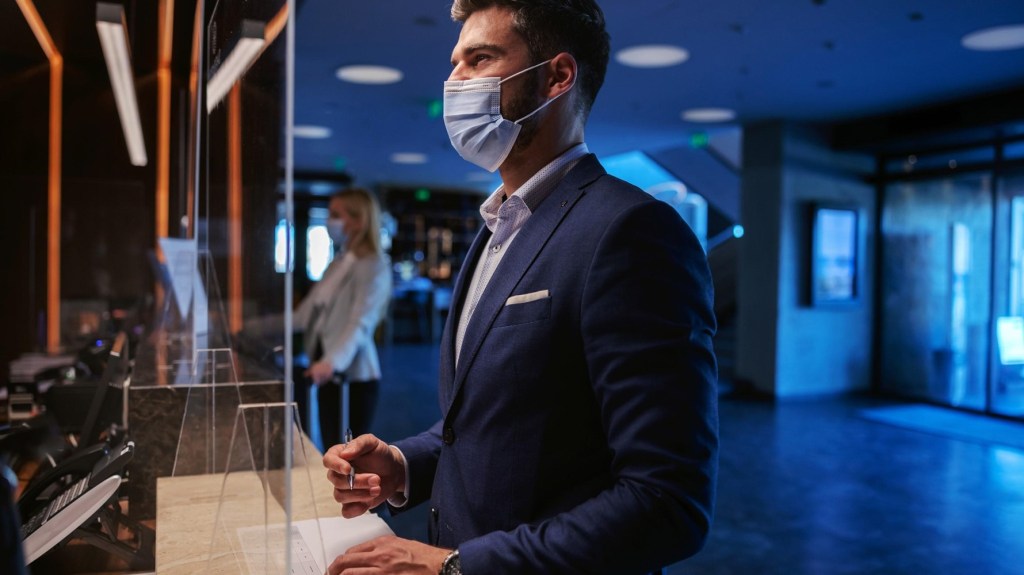
Great expectations: How to prepare your travelers for their first hotel stay
In countries around the world, millions of people – now fully-vaxxed and relaxed – are emerging from the stagnation of lockdown, and booking hotel rooms with a ‘Roaring Twenties’ fervor. The U.S hotel industry recorded its best performance in 62 weeks at the end of May. Global occupancy reached 46% in April 2021 compared to 13% the year before.
After the most challenging period in recent history, hotels are enthusiastically doling out room keys like confetti. A year of evolving from fumbling with face masks to polished protocols has boosted hotelier’s confidence, and the results have been beyond admirable for an industry that felt the sting more than most.
But cost-saving initiatives, and health and safety measures impacting services like the much-loved hotel buffet, means the traveler experience won’t be the same as it was.
For example, the UK is experiencing a perfect storm of furloughs, a post-Brexit exodus, and a meteoric rise in bookings, leading to staffing shortages. None of this should put a damper on enthusiasm but it helps to prepare your travelers in advance, to ensure they get the best out of their first hotel stay.
We’re all in this together
If a company has not previously introduced a tool to solicit hotel reviews from travelers, encourage them to use tools such as CWT Hotel Reviews to help provide leading indicators to gaps in service levels that can be proactively addressed, helping hotels to adapt to the new normal faster.
Travel arrangers should stay in contact with partners who can help you to make sense of trends and opportunities. With the help of industry experts, you can identify evolving risks and opportunities as travel volumes return, adapting as the market evolves, listening to travelers’ feedback, and adjusting your hotel programs to suit. Program optimization will not be a once-a-year phenomenon anymore.
Book in-channel
It’s critical that travel managers continue emphasizing the importance of booking in channel for duty-of-care reasons, but also so that companies can make progress on issues that were important for travelers pre-pandemic, such as sustainability, wellbeing and seamless travel experiences.
RoomIt by CWT’s AI-powered hotel search platform, Intelligent Display, makes it easier than ever for travelers to book in-channel.
Read the fine print
Help your travelers avoid the disappointment of packing a swimsuit only to find the pool closed by advising them to review guidelines and amenities prior to booking. Ensuring travelers have the most up-to-date information will limit the amount of surprises and challenges during their travel.
It’s an exciting time for travelers, travel arrangers and hoteliers alike. A collaborative attitude, data-driven insight and effective communication with your travelers, will help usher the return and evolution of something we’ve all been longing for: A night away from our own four walls.
Image credits: Adobe Stock
-
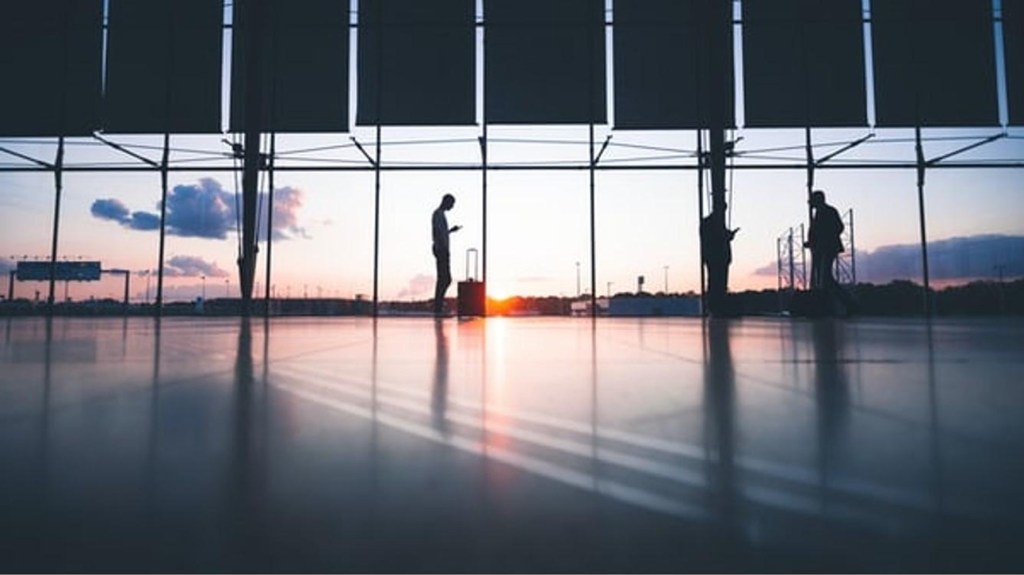
Terminal tips: 5 changes to expect at the airport
The vaccination rollout is well underway in many countries, restrictions are being lifted and nations are reopening their borders to welcome travelers again.
So we are ready to travel again? Yes we are. In February 2021, we polled our 186,000 LinkedIn followers and found that 57% were ready to travel. Many of us have jumped on a plane since then. But will the traveler experience be the same as pre-COVID? The answer to that is a simple but firm ‘no.’ Although travel is picking up slowly in several regions, the pandemic is still not a thing of the past. What can you expect to be different at the airport when you get back to travel and what can you do differently?
Social distancing
Social distancing will still be in effect at check-in, security controls, baggage halls and all facilities at the airport, with many expecting measures to last for years. Some airlines are still blocking the middle seat to ensure distance between passengers.
Sanitary measures
At almost every airport, sanitary measures will remain strict. Expect to wear a face mask and sanitize your hands regularly. On board, your seat, tray table and overhead compartment will be cleaned. The flight attendants will do their utmost to ensure ‘sanitary safety’. Check the sanitary measures of your departing airport before you start your journey.
More than a passport
Many countries have started to require international travelers to carry a recent negative PCR COVID-19 test report. Proof of vaccination may soon be required in place of, or in addition to, a negative test report. The need for a digital health passport or certificate to accommodate this has been an ongoing discussion over the last 6 months. Recently BTN announced that Europe reached a provisional deal on digital COVID certificates to allow free movement.
Longer security lines
Despite ‘fast lanes,’ security screenings at airports will take longer. Some airports will facilitate biometrics technology via eyes or facial recognition to speed up the process of getting people through security. Some biometrics companies are now able to recognize a passenger successfully with a face mask.
‘Touch-free’ at all times
The pandemic has certainly accelerated the advancement of the ‘touch-free’ travel experience. More airports will be facilitating and promoting self-check in, tagging, biometric security checks and baggage drop-offs. Contactless food ordering apps are being developed for airports, to avoid queues.
The airport travel experience has certainly changed over the last year. Some of the changes will likely disappear when the pandemic is a thing of the past. Stay up to date on the latest guidelines and restrictions of every destination worldwide via CWT Travel Essentials and make informed and timely decisions.
Image credits: Adobe Stock
-
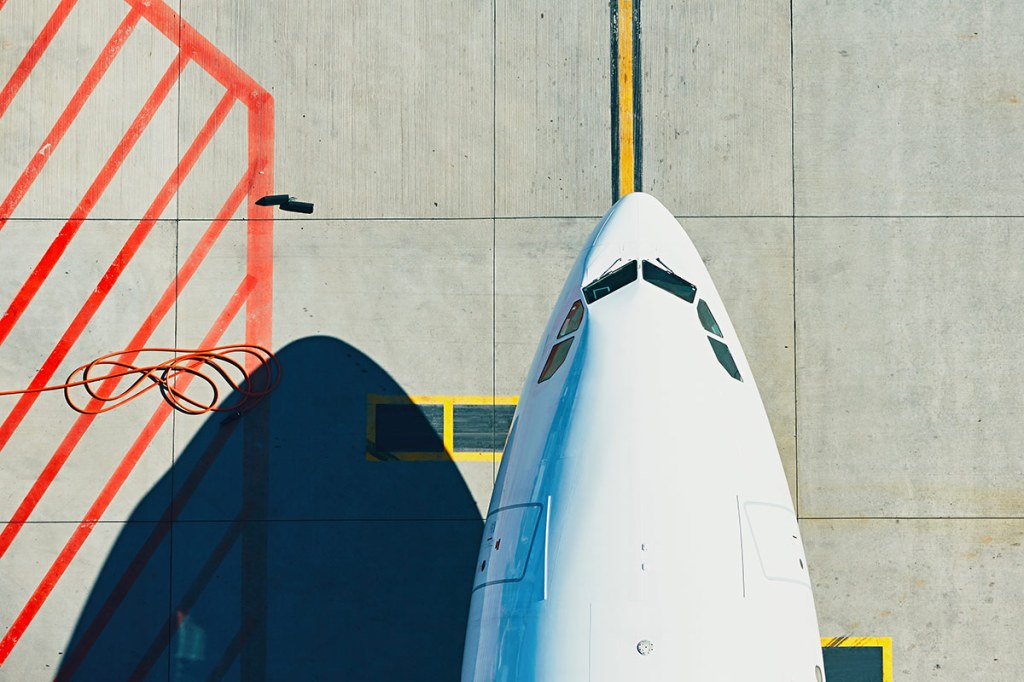
Managing unused flight tickets – 5 tips from CWT on saving money when business travel picks up
Here are some tips on how to manage your unused tickets.
- Know how many unused tickets you have and when they expire. Our business intelligence platform, CWT AnalytIQs, gives you 24/7 access to information on how many tickets are available, how many have been used, have expired or are about to expire, as well as the value of those tickets. Additional dashboards introduced in 2020 and 2021 capture vouchers and unused tickets that were issued by airlines to travelers when COVID-19 impacted travel.
- Move from manual to automated tracking, including the identification, processing and reporting of any unclaimed refundable tickets. Tickets are tracked from the time of booking until they are used or refunded. This automated process helps improve efficiency, increases accuracy and reliability of the data, reduces the number of expired tickets and ensures refundable tickets are not left unclaimed.
- Enable visibility in online booking tools so travelers and travel arrangers are aware they have an unused ticket available as they book their next trip. CWT’s unused ticket tracking solution helps guide travelers and arrangers to use their available unused tickets by making these visible in online and offline booking channels.
- Communicate to travelers and travel arrangers about any unused tickets, before they expire. Use CWT’s messaging service to send automated reminders and notifications to travelers and travel arrangers and create awareness of what unused tickets are already available before booking a new ticket.
- Configure your policy to automatically apply an available unused ticket at any point of sale, ensuring no tickets go to waste. Through standardizing your policy and integrating technology to automatically allow name changes, travelers and travel arrangers can use all available tickets, saving the company money.
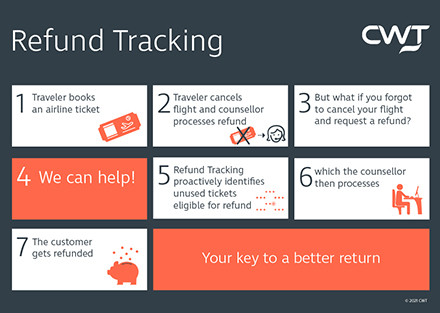
- Know how many unused tickets you have and when they expire. Our business intelligence platform, CWT AnalytIQs, gives you 24/7 access to information on how many tickets are available, how many have been used, have expired or are about to expire, as well as the value of those tickets. Additional dashboards introduced in 2020 and 2021 capture vouchers and unused tickets that were issued by airlines to travelers when COVID-19 impacted travel.
-

CWT launches Intelligent Display – an intuitive new hotel search by RoomIt
CWT, the Business-to-Business-for-Employees (B2B4E) travel management platform, today announces the global roll-out of Intelligent Display, a powerful new addition to the hotel platform of RoomIt, its global hotel distribution division.
Bringing a consumer grade recommendation engine to Online Booking Tools (OBTs), Intelligent Display uses machine learning to promote contextually relevant and policy compliant hotels and rates to travelers. Using a centralized data source of client hotel programs and policies, Intelligent Display helps maintain consistency of content between channels, ensuring that travelers and travel counselors have the same information and access to relevant content. In addition, Intelligent Display provides clients access to in-depth data evaluation and reporting facilities – including industry-leading missed and realized savings analysis – to help unlock savings and improve traveler satisfaction.
“Throughout the pandemic, we’ve concentrated on creating solutions to solve the travel manager’s biggest challenges. Out-of-channel bookings,” said Derek Sharp, Chief Operating Officer of RoomIt. “Poor user experience, complexity and lack of choice can all drive hotel program leakage. So the RoomIt team focused on developing capabilities that balance all parties’ needs – travelers, travel managers and travel counselors – to help reduce booking abandonment and maximize the safety, policy-compliance and cost effectiveness of our clients’ hotel programs.”
“Intelligent Display delivers best-in-class capabilities in a simple, user-friendly and accurate way. The improved experience will also help keep travelers booking in channel, helping travel managers maintain duty of care as travel resumes post-Covid,” Sharp concluded.
Intelligent Display enables clients to use RoomIt by CWT as their exclusive source of hotel content with select online booking tools (OBTs) in the market.
CWT is a leading global partner in business travel, meetings, and events. Operating across six continents, we deliver sustainable, tailored solutions that help organizations connect, engage, and thrive in an evolving world. Our myCWT platform integrates advanced technology with human expertise to simplify travel and enhance traveler and attendee experiences. Extensive global coverage, seamless data integration, AI-driven analytics, and carbon-conscious travel tools enable businesses to optimize their travel and meetings programs while delivering measurable value.
With 150 years of industry experience and a deep commitment to partnership, CWT collaborates with clients to shape the future of business travel and events, making them more efficient, responsible, and impactful.
RoomIt is the hotel distribution division of CWT – matching travelers with the right room at the right rate, and providing travelers with the amenities and loyalty programs they want, while helping organizations control their budget and improve travel oversight.
-

Net zero, carbon neutral or climate neutral? A guide to carbon jargon
Understanding carbon jargon is all about making up the balance: of the emissions caused, as well as what we can do about them. By knowing about carbon balance and using the right terms, decision-makers in the travel industry can take the necessary measures to set and achieve their carbon goals.
Strictly speaking all these terms have different definitions according to the IPCC, the UN body for climate science. However, companies often use them interchangeably, without always specifying their application. As a result, their climate commitments vary widely. This poses a real challenge to distinguish between serious climate action (that is aligned with the Paris Agreement) and so-called ‘greenwashing’.
Companies have a responsibility to communicate clearly about their commitments. Sustainability action with all its dimensions should be transparently quantified, documented and audited to be sound. This not only spares you from allegations of greenwashing but also signals that you take your responsibility seriously, and offers a real chance to stand out against others in your industry. Here are some commonly-used terms and their definitions.
Science Based Targets
The Science Based Targets initiative (SBTi) provides methods and tools for corporates to set emission reduction targets aligned with a max. 2-degree warmer world. This would be in line with the Paris Agreement, in which almost all countries agreed to limit global warming to a level still manageable. The targets are validated by the SBTi and give corporates competitive advantages and credibility for their real climate ambition. For example, a number of airlines, including many leading U.S. carriers, the 13 members of the oneworld Alliance, and others such as Delta, Singapore Airlines and Etihad, have committed to a highly ambitious net-zero target by 2050, in line with a maximum 1.5°C warmer future. Meanwhile, hotel chains such as Hyatt, Accor and Hilton have committed to reduce the emissions from company operations to keep global warming below 2°C.
Greenhouse gas accounting
The preparation of a greenhouse gas (GHG) inventory lays the foundation for any corporate climate action. It is the prerequisite for developing a climate strategy and expedient climate protection measures. It should be complete, consistent and accurate, regarding the full scope of climate impacts from all activities. A company’s climate strategy often comprises a mix of measures, depending on the long-term targets and technical, organisational and financial possibilities. Only reduction measures that really change operations and processes lead to a real reduction of a company’s footprint. As such efforts take time and until they show their full effect, many corporates decide to offset their emissions, as an intermediate measure. They can also do this for specific (unavoidable) categories such as their business travel emissions.
Carbon offsets
Offsetting is a bridge to a net-zero future by financing CO2 mitigation in a wider, global context outside of the corporate’s own value chain. Offsets mostly support renewable energy and energy efficiency projects. Such projects accelerate the global transformation towards a low-carbon society. For a transitional period, offsetting can constitute part of a wider corporate net zero strategy. However, offsetting should complement but not replace stringent emission reductions within the value chain if we want to reach the Paris goals. Effective offsetting projects with a strong added value can be recognized by quality audits such as the Gold Standard.
Carbon Insets
Insetting describes reducing the carbon emissions or abatement within a company’s value chain. Carbon insetting is about changing operations and production processes. Thus, it really reduces a company’s carbon footprint and helps to decarbonize industries. An example within the travel sector are sustainable aviation fuels (SAFs), which (even in the near future) pose a substitute for fossil jet fuels. They potentially reduce flight carbon emissions by up to 80%. Currently, airlines like KLM and SAS are introducing SAFs in parts of their operations. Again, it is important to regard the whole lifecycle of such insetting products. Only if they are produced from renewable sources (e.g. by using ‘green’ hydrogen) can they be considered truly carbon neutral.
Carbon neutral
According to the IPCC, carbon neutrality is achieved when carbon emissions are balanced by the same amount of carbon removals from the atmosphere. Such carbon removals do not include carbon offsetting through mitigation elsewhere. However, many companies currently use this term in an offsetting context, and there are numerous providers of ‘carbon neutral certificates’ to acquire such labels – with varying, often non-transparent conditions. Since carbon offsetting without a Paris Agreement aligned emission reduction is not helping to limit global warming to max. 2 degrees, such practices are often related to greenwashing activities. As a corporate it is important to avoid the risk of such allegations.
Net zero (or greenhouse gas neutral)
In contrast to mere carbon neutrality, according to the IPCC, the definition ‘net zero’ includes neutrality also of other greenhouse gases such as methane and nitrous oxide. ‘Net zero’ has become the defining lens through which many governments and businesses view decarbonisation. For example, the German government aims to reach net zero greenhouse gas emissions by the year 2045.
However, similar to carbon neutrality, this term is not protected and not used consistently. For example, greenhouse gases should not be offset but really removed from the atmosphere. To tackle this inconsistency, the SBTi currently develops an international standard for corporates aligned with the goals of the Paris Agreement. It requires from a corporate to take robust measures to significantly reduce multiple emissions. Companies that are currently pursuing this goal, such as Coca-Cola Company or BMW, can claim that they are ‘on a path to net zero’.
Climate positive/Carbon negative
A corporate can become climate positive when it goes beyond its net zero commitment. A company then, on top of its net zero commitment, mitigates its emissions through carbon offsets. The SBTi net zero standard will give a clear definition of how offsetting can be integrated into the net zero commitment to achieve a climate positive approach. Nowadays however, this term is often used by companies to simply describe that they offset more carbon emissions than they emit.
Climate neutral
This term is often used as substitute for ‘carbon neutral’, but according to its definition by the IPCC is actually comprising a far wider scope. It should include all corporate activities that have an effect on the global climate, including water systems and land use. Since almost all human action has an effect on climate, true climate neutrality is almost impossible to claim. The term is not protected and is often used by solely offsetting emissions by carbon credits, without validating to Paris Agreement aligned emission reductions. Therefore, every corporate should carefully evaluate whether this term really adequately represents their climate action.
An increasing number of stakeholders in the travel industry and beyond, are showing a commitment to true emission reductions and a goal of net zero/neutrality. Demystifying the jargon is a step towards a cleaner, and greener future.
-

Around the world in four venues: Top destinations for small meetings
A recent study by New York University’s neuroscience department points to a correlation between new and diverse experiences and enhanced happiness. If we didn’t know that before, we definitely do now. Millions of us have experienced the monotony of lockdowns, and the subsequent first taste of freedom.
It’s a joy to have social lives back and reconnect with loved ones but we can’t neglect our working lives.
While there are many advantages to working remotely, including increased productivity and work-life balance, the occasional face-to-face is rocket fuel for innovation, motivation and team bonding.
When it comes to sales, an in-person meeting at a great venue can save months worth of prospecting. According to research by Gartner, in companies with 100 – 500 employees, an average of 7 people are involved in most buying decisions.
CWT easy meetings is an online booking platform that gives meeting organizers access to more than 250,000 meeting rooms at hotels and independent venues in more than 90 countries. We take a look at four of the hottest Easy Meetings cities for your next gathering.
London: Host with the most
If you’re going to describe any city in superlatives, it has to be London. 2,000 years of history and waves of migration have made London one of the most multicultural cities on earth with one of the highest concentrations of iconic buildings, celebrated restaurants and award-winning art and culture (much of it free).
Choose from a venue in creative hubs like East London’s Shoreditch, a historic listed building by Regents Park, or a sleek conference room at the Shard. Small meetings planners are spoiled for choice, and supported by great transport links and amenities.
A good midway point for visitors from Asia and the Americas, as well as Britain’s most-favored staycation destination, London is enjoying more freedom than most cities with the added bonus of lower-than-usual rates.

New York: Big views, big vision
From the sites of Manhattan to the hipster hubs of Brooklyn, the city that never sleeps can’t help but inspire your team to dream big. An incredibly diverse range of meetings venues, huge range of accommodation and a grid-based layout making the city incredibly easy to get around.

Buenos Aires: Romance & reinvention
Argentina’s sprawling, southern city runs the gamut from a historic center replete with a mix of Italianate, French and Modernist buildings to down-and-out docklands that have been turned into sophisticated bars, experimental restaurants and art galleries.
Yes there’s tango, merlot and epic steak but there’s so much more to inspire your attendees. Ticking all the boxes for great infrastructure, gastronomy and culture, Buenos Aires is an ideal meeting destination.
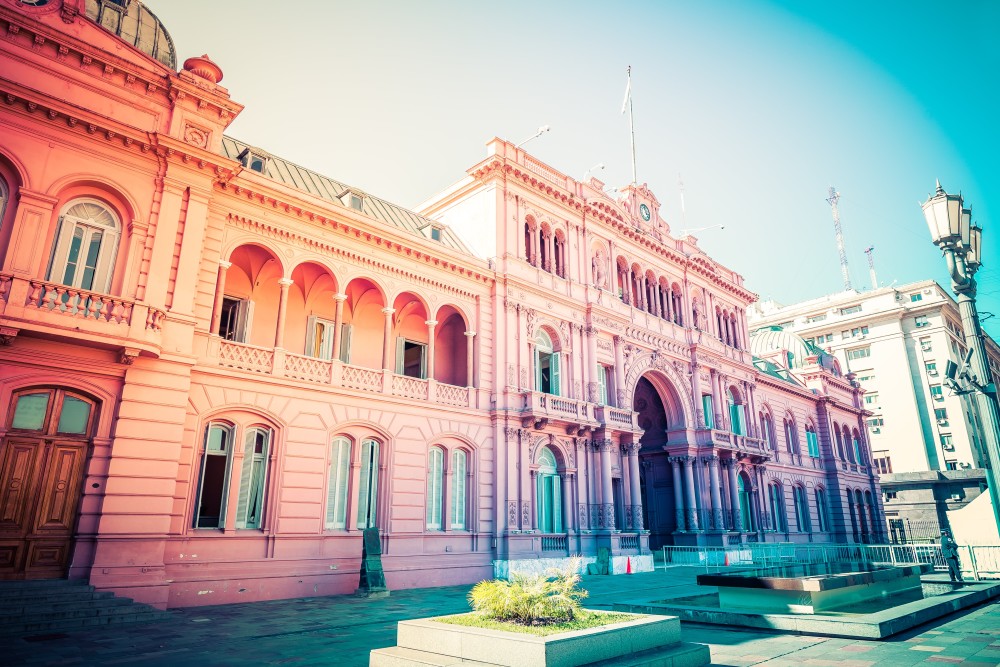
Sydney: Style & surf
In a 2019 poll by CVENT, Sydney took the number one position as the most popular destination for business meetings and events in the region. It’s no surprise. This visually-stunning city, draped around a glittering harbor has the best of both worlds. It’s cool and cosmopolitan with an abundance of bars, restaurants and cool hotels. In between cutting deals, your meeting attendees can choose to pitch up at Bondi beach or one of many beaches in the Eastern suburbs to surf, swim and experience life as a clean-living Sydney-sider.

Book your next in-person meeting at CWT easy meetings.
-

CWT partners with Delta on a sustainable aviation fuel agreement to mark World Environment Day
CWT, the Business-to-Business-for-Employees (B2B4E) travel management platform, today announces its partnership with Delta Air Lines on an agreement to purchase enough sustainable aviation fuel (SAF) to cover the projected fuel usage from all of CWT’s travelers on Delta on 5 June, World Environment Day.
“Actions speak louder than words, and we are delighted to further cement both our wide-reaching partnership with Delta and our commitment to responsible business, in such an innovative and public initiative.” said Patrick Andersen, CWT’s Chief Commercial Officer.
The agreement underscores CWT’s commitment to environmental stewardship, a core part of its strategy, culture and consulting activities as a U.N Global Compact signatory since 2012.
The agreement is part of Delta’s Flight to Net Zero initiative that encompasses the company’s industry-leading global carbon neutral goal. It also represents new initiatives, products and standards that will advance clean air travel and accelerate the reduction of carbon emissions.
“Our strong sustainability partnership with CWT helps to drive the industry forward to a more environmentally-sound future,” said Steve Sear, Delta’s Executive Vice President of Global Sales, “and underscores a conceptual alignment within the travel industry to proactively find solutions for the carbon footprint created by travel.”
CWT is a leading global partner in business travel, meetings, and events. Operating across six continents, we deliver sustainable, tailored solutions that help organizations connect, engage, and thrive in an evolving world. Our myCWT platform integrates advanced technology with human expertise to simplify travel and enhance traveler and attendee experiences. Extensive global coverage, seamless data integration, AI-driven analytics, and carbon-conscious travel tools enable businesses to optimize their travel and meetings programs while delivering measurable value.
With 150 years of industry experience and a deep commitment to partnership, CWT collaborates with clients to shape the future of business travel and events, making them more efficient, responsible, and impactful.
Delta Air Lines recognizes its role in growing empathy, respect and care for the planet and the people within it. From being the first and only U.S. airline to voluntarily cap greenhouse gas emissions at 2012 levels to last year’s commitment to be the first carbon-neutral airline globally, Delta has a longstanding commitment to sustainable air travel.
Delta was the No. 1 airline named among America’s Most Sustainable Companies by Barron’s in 2020, the only U.S. airline included in the 2021 S&P Global Sustainability Yearbook and has received the Vision for America Award by Keep America Beautiful and Captain Planet Foundation’s Superhero Corporate Award. Delta has also earned a spot on the FTSE4Good Index for six consecutive years and the Dow Jones Sustainability North America Index for ten consecutive years.
-

CWT granted accommodation patent by the United States Patent and Trademark Office
CWT, the Business-to-Business-for-Employees (B2B4E) travel management platform, has been granted a patent by the United States Patent and Trademark Office (USTPO), in order to better refine and align accommodation options to business trip parameters.
The patent is the second accommodation-related patent award in the past three years, and follows the 2017 launch of RoomIt, its industry-first hotels proposition.
“The development of patented technologies reflects our aim of delivering a consumer-grade experience in the business travel space,” said John Pelant, CWT’s Chief Technology Officer. “Our approach has been driven forward by consistent, significant investments in both technology and people skills.”
CWT has successfully been issued nine patents in as many years (2013-2021), covering a range of technological innovation from messaging to boarding-pass retrieval, and site navigation to user interface developments.
CWT is a leading global partner in business travel, meetings, and events. Operating across six continents, we deliver sustainable, tailored solutions that help organizations connect, engage, and thrive in an evolving world. Our myCWT platform integrates advanced technology with human expertise to simplify travel and enhance traveler and attendee experiences. Extensive global coverage, seamless data integration, AI-driven analytics, and carbon-conscious travel tools enable businesses to optimize their travel and meetings programs while delivering measurable value.
With 150 years of industry experience and a deep commitment to partnership, CWT collaborates with clients to shape the future of business travel and events, making them more efficient, responsible, and impactful.